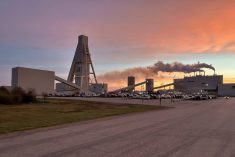Milk is often criticized as being too expensive in Canada compared to the United States, but the chair of Alberta Milk says it’s good value.
Hennie Bos, a dairy farmer near Lacombe, Alta., said milk prices are not high considering what consumers get.
“I would say, if you look at your total grocery basket, dairy is only one percent of what your grocery basket is, so it’s all relative. But good wholesome product is not cheap. In this case, I would argue it is a fair price,” Bos told a south region meeting of Alberta Milk Oct. 30.
Read Also

B.C. ostriches culled, CFIA confirms
Ostriches on an embattled Edgewood, B.C. farm have been culled after a prolonged legal battle, the Canadian Food Inspection Agency has confirmed.
Canadian dairy product prices are set using a complex formula derived from production costs and the consumer price index.
Bos said milk prices in countries that have deregulated milk pricing are much higher, citing New Zealand as an example.
Statistics Canada figures for July 2012 indicate the average retail price for whole milk in this country was $2.39 per litre and partly skimmed milk sold for an average $2.30 per litre.
However, Bos said 85 percent of milk in Canada is sold in four litre jugs at about $4.65 per jug, which would then put the cost at $1.12 per litre.
The U.S. Bureau of Labour Statistics lists the U.S. average retail milk price at $3.47 per U.S. gallon in September, or 92 cents per litre.
Average price in New Zealand is more difficult to confirm. The New Zealand Herald pegged it at $1.79 per litre in the July 2011-12 fiscal year but didn’t specify whole or skim product.
Dairyco, a British dairy farmers organization, lists its average liquid milk price at about $1 Cdn per litre.
Bos said the latter low price was the source of dairy farmer protest this past summer. Deregulation has put farmers there into a declining spiral, and the country no longer produces enough milk to supply its own residents, he said.
“You can only compromise (on milk price) for a period of time but not for a long time, because there’s no point in staying in business,” he said.
“There needs to be a balance that all stakeholders in the food chain are getting fairly compensated. It’s the producer, it’s the processor, it’s even the milk hauler. Under supply management, it’s there.”















